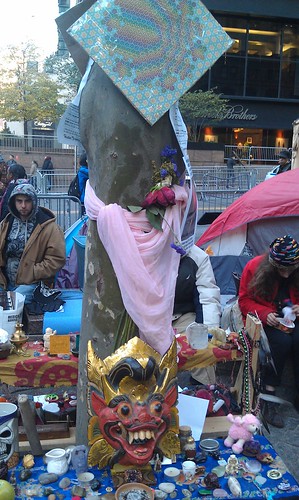Back to the desk. Yes, I still have my workstudy. And school to finish. And I have no clue how I'm going to make any money after the first of the year.
But I need to be here. I almost avoid it when I'm in the midst of a job cycle. I mean yes, I still write. I'm always writing, eeking out some words here and there. But the desk is as much about reflection as it is the act of writing and on the job -- where it's important that I stay in the moment in order to stay on task -- it's difficult to find time to reflect. Meditate, yes. But not reflect.
And so here I am. Nina Simone on the speakers. Coffee nearby. Dogs Lounging around my chair (for now.) Yesterday's rain is gone, but everything outside is cold and damp to the bone. We're heading out for Chicago early Monday morning to catch Amtrak's The City of New Orleans down to that city.
I left New Orleans in November, almost 20 years ago, running for Kentucky. I loved the city and was starting to make a pretty good home there. Had a job I didn't hate, friends, and I was about to find an apartment somewhere that wasn't the roach infested rooming house I'd been living in on the corner of Palmyra and N. Jefferson Davis that had been a trap house before the city shut it down, sold it to a fly-by-night management company that didn't even bother to slap some new paint on it before renting it out. I felt at home there in a way I'd never felt at home before. It's one of those cities that gives you the space to reinvent yourself or takes you as you come; it doesn't tolerate fools, but it will, generally, try and embrace them anyway.
Home has always struck me as an odd word with an odd weight. It's an Old Germanic word, at the root (heim, pronounced hām) that describes a spaces where souls are gathered. Contemporaneously, people associate with four walls (at a minimum), a roof, a door, and a window (at a minimum.) The gathering of souls is not required by the strictest definition, and this is best described by the term used to describe an opposite state of being: homeless.
A person described as homeless is someone without secure shelter; the legal definitions vary based on who wrote the statute and whether HUD money is attached to a particular housing program. For example, sleeping in your car is generally defined as being homeless, and so is sleeping on a friend's couch for more than a month. But cities tend to define homelessness based on the proximity of people sleeping outside to the centers of business and tourism. That's in practice, anyway, even if it isn't how they describe it in legalese. In practice, the operational definition of being homeless is applied in direct proportion to the person or people in question's distance to commerce. If that bothers you or strikes you as wrong, that's the correct response for a human. If your reaction is "Yeah, but..." you might be a politician, or genetically related to one. If you have no reaction, you're either a cop or a member of your local Chamber of Commerce.
When I moved to New Orleans, it was the first place I ever went that I didn't have a plan, didn't really know anyone I'd call a friend. I slept on my ex-wife's couch for a week in Lacombe before I found the rooming house. Interestingly enough, my first ever Greyhound trip was from New Orleans, back up to Lexington, only to return to that city of dreams on the bus. Before that I'd slept in my car before, slept on friends' couches. I didn't think of myself as homeless because I always had a sense of where I was and the periods of solitude were always punctuated with the company of friends. Living in New Orleans transformed me in a lot of ways; it taught me that I could survive and that I had a definite survival instinct in spite of my sometimes unhealthy behavior and deep swings of depression. It also taught me that I had find a different mode of self-definition besides the usual economic markers that had convinced me I was a failure.
I'm lucky now to have a home -- that is, the company of a soul. There are people who live much better, economically speaking, who can't say that. And I'm looking forward to revisiting my city of dreams with her on the train I used to watch from my car in the parking lot before work.









